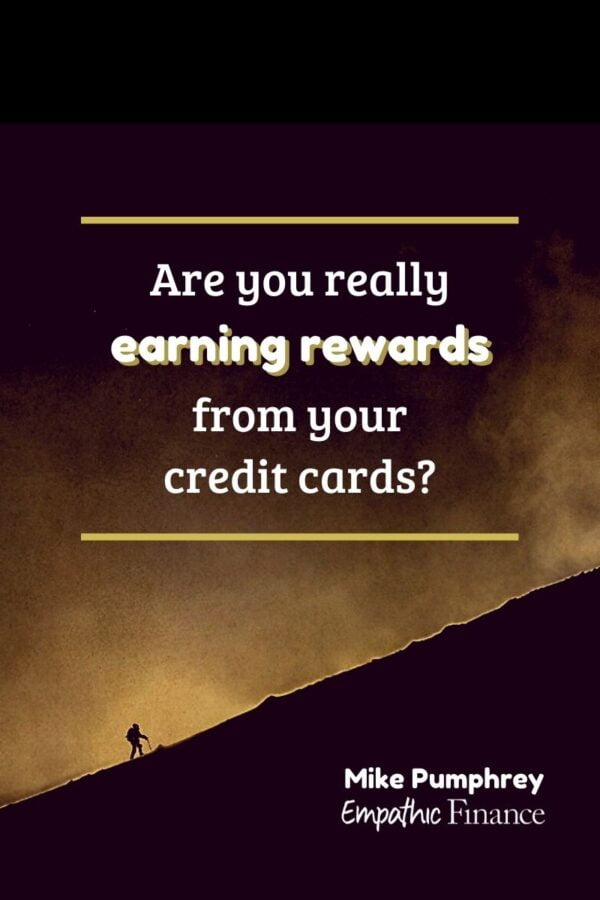I discuss the reasons why people say they put everyday spending on credit cards, and ask whether the rewards are really worth it.
My biggest professional challenge, by far, is how to convince people not to put their everyday spending on a credit card.
The fact that I don’t always succeed in this, even with clients who are paying me, I think might say less about my own powers of persuasion than the ingrained cultural power of credit card companies. They have done something brilliant; they make people think they are outsmarting credit card companies…while still paying credit card companies.
Nevertheless, I still persevere. Why? Because of the simple facts:
- You can’t go into debt with your household spending if you don’t use a credit card.
- Using a debit card forces you to make sure that you have the money to pay for things, increasing awareness and clarity (and see above).
- It’s simpler by half. With a credit card, you purchase something and then pay it off. With a debit card, you purchase something. No matter how automated you make things, it is still a two-step process with a credit card
- You spend more when you use a credit card.
So with this in mind, I want to share some conversations I have, in the Sysyphusian task of trying to get people to not use their credit cards for everyday purchases.

Table of Contents
Cash back
Jean* spends a lot of time in her car for her job. And that means a lot of gas.
When we talked about how much gas she spends each month (as part of our expense tracking process), I threw out some numbers. $100? $150?
I was so off. It was over $400. Wow.
It turned out that she puts all of her gas purchases on a credit card. She said that she used a specific card because it gave her cash back.
I blinked. I’ve encountered this scenario so many times, but I’m still caught up short by it.
“How much cash back are we talking about?” I asked. I’ve seen specific category deals (5% back at restaurants, etc.) come and go, but I don’t know of any longer term deals like that.
“I get 1% back every month.“
I took a beat, and did a quick calculation.
“So, if I understand this correctly, you’re putting hundreds of dollars on this credit card each month, and you’re getting in return, one single Starbucks per month?“
Now it was Jean’s turn to blink.
All of that effort to keep and maintain a credit card, for one cup of coffee each month?
My hat is off to the credit card companies, who have us believing that this is somehow a good deal. How little it takes to buy us.
Travel rewards
Now of course, the big one here is the travel rewards. The prospect of free travel makes people lose their (financial) minds.
And I love free travel too! I’ve used my share of points over the years. So I’m not saying it’s all a scam (even though it often is).
But it has to be worth it. And for many people, it often isn’t.
Mitchell had a travel card with an annual fee of $99. This card gives 1 point for each dollar spent on the card, which turns into $0.01 travel cash for each dollar spent.
Pretty much everyone I know, client or no, uses some kind of travel card that gets some kind of deal like this. They put all their spending on a credit card, and rack up the savings.
Or do they? Because for the privilege of earning these points, they:
- Risk going into debt (if they spend more than they have)
- Lose insight into their purchases (unless they closely track it)
- Have to pay an annual fee
So with a card like this, Mitchell needed to spend $9900 on the card per year just to break even on the annual fee.
That’s almost $1,000 a month, just to hit zero!
Let’s say that you double this amount in spending. At the end of the year, what do you have?
$99.
After factoring in the annual fee, you have to put about $20,000 on a card to get $99 in travel benefits.
Do we have so little faith in our own ability to save that we risk debt, changing credit card terms, and the vagaries of the airlines, just to earn a single Benjamin in a year?
My work continues
“You’re putting hundreds of dollars on this credit card each month, and getting in return, one single Starbucks?”
Maybe once I figure this all out, I’ll be ready to retire.
But until I’m able to convince people to not put their everyday spending on a credit card, and instead teach them to prize the financial clarity that comes with paying with their own money, my work will continue.
* Names and stories are composites from multiple experiences.


